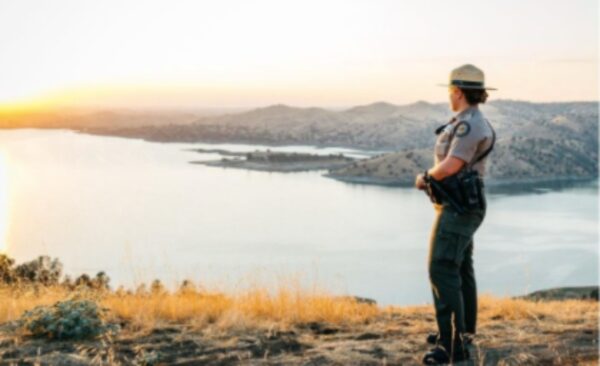Rufus Burgess arrived in California in the late 1840s and built a fortune during the Gold Rush. Having once been enslaved, Burgess was a freeman. On his land, he grew fruit bearing orchards and ran a blacksmith shop. For more than 100 years, the Burgess family thrived on the land until it was taken in 1947 under eminent domain laws. That is the account of the family history given by at least one of the descendants.

Today Jonathan Burgess is leading his family’s fight for the state to return the land, which is part of Marshall Gold Discovery State Historic Park in Coloma. Coloma is approximately 36 miles northeast of Sacramento.
“Ultimately, our goal is to have our land returned, but first to recognize what actually took place,” Burgess, a resident of Northern California, told USA Today. “If we as Americans want to truly heal our nation and atone for what happened to Black people that were formerly enslaved and descendants of slaves, we’ve got to first tell the truth, as difficult as (that) may be.”
The Burgess family claims that their ancestor, Rufus, once owned “half the park.” However, there is no documented land ownership in Coloma under their family name. In addition, there are no historical markers present on park grounds to even prove that the land once belonged to the Burgess family. This has placed the family in a dispute with park officials; it is difficult to provide reparations or recognize the family’s legacy without any documentation.
Jeff Lee, a member of the nonprofit, Gold Discovery Park Association told the National Geographic that the land that is thought to have been owned by the Burgess family was an estimated 11 acres, according to a deed from 1881. While Lee is not a representative of Coloma State Park, his support with research positions him to provide documentation that might allow park officials and the Burgess family to reach an agreement.
The Burgess’ family is not alone in the dispute with government entities in the United States. Across the country, Black families are fighting to have land returned to them which was unjustly confiscated by various government entities going back as far as the Civil War. Many of these families believe that their ancestors’ land was confiscated for one reason: race.
Black families in an area of Athens, Georgia, once known as Linnentown are now seeking repair after their ancestors were driven from their land so the University of Georgia could expand. In Los Angeles, urban renewal projects displacing over 600 Black Americans in the Pico and Belmar Triangle sections of the Santa Monica. In 2021, descendants of Charles and Willa Bruce ended a nearly century-long fight to reclaim parcels of land on Manhattan Beach that overlooks the Pacific Ocean in Los Angeles County, California, worth an estimated $70 million. Displacement and land confiscation have contributed to Black Americans ability to retain generational wealth.
Land Confiscation and Lack Of Equitable Compensation
Under eminent domain, a government has the right to seize private property for public use. Private property can be expropriated to facilitate various modes of transportation such as highways, railways, or local roadways; expand water supply; develop public buildings; and, support the defense of the country. When eminent domain occurs, residents are typically provided compensation to relocate. However, it has been well documented that the displacement of people carries not only emotional distress, but the compensation does not allow landowners the ability to retain their wealth.
The U.S. Commission on Civil Rights revealed that eminent domain displaces Black Americans five times more often than their actual representation in the nation’s population. The Commission’s recent publication, “The Civil Rights Implications of Civil Rights Abuse” documents several federal cases and the impact eminent domain has had on minority communities. A 2007 study included found that Black and brown communities were not able to defend themselves against eminent domain procedures and says: “Taken together, more residents in areas targeted by eminent domain—as compared to those in surrounding communities—are ethnic or racial minorities, have completed significantly less education, live on significantly less income, and significantly more of them live at or below the federal poverty line.”
“Black and Latino (people) have been the primary victims of eminent domain abuse and have almost never been paid market value for their property,” Thomas W. Mitchell, a Texas A&M law professor who focuses on property law and the loss of Black-owned land, told USA Today.
Black farmers, for instance, have been in a battle with the U.S. Department of Agriculture for decades. Farmers are citing mistreatment and discrimination as they lost 90 percent of the property throughout the 20th century. The farmers’ class action suit did not provide long-term relief and the ability to recover has been stymied by lawsuits filed by white farmers along with Congress’ inability to pass the Build Back Better legislation that would provide free preschool, subsidized child care, and Medicare expansion.
Organizing For Change
The historical mistreatment of Black landowners has led to the development of Where Is My Land, a nonprofit organization with a mission to assist Black Americans recover their land and receive repayment. Since its launch in 2021, the organization has received 400 requests from Black families across the United States. The Burgess family is just one of those families.
“I think that California, but more importantly America, is ready for the truth,” Burgess told USA Today. “I plan to yell on every mountaintop until we get there, and somebody pays attention or people begin to question: Why don’t we talk about the pioneer Black families or the Black congregations that were here in the town? None of that’s talked about.”
Also Read: Is This Enough? Santa Monica Offers Descendants of Displaced Black Communities Affordable Housing.





My mother’s maiden name is Burgess. She was born on Oklahoma, and many of her relatives settled in various places in California. Please provide any other information regarding this land and all involved. Thank you